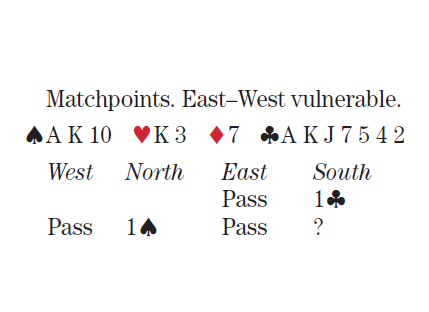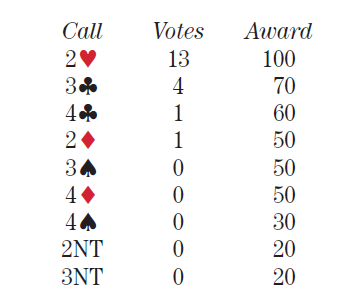
What’s your call?
| 1NT | ||||
| 2♣ | 2♦ | 2♥ | 2♠ | 2NT |
| 3♣ | 3♦ | 3♥ | 3♠ | 3NT |
| 4♣ | 4♦ | 4♥ | 4♠ | 4NT |
| 5♣ | 5♦ | 5♥ | 5♠ | 5NT |
| 6♣ | 6♦ | 6♥ | 6♠ | 6NT |
| 7♣ | 7♦ | 7♥ | 7♠ | 7NT |
| Dbl | Pass |
The weight of the panel comes down on the side of what Sanborn calls “a vile bid, to be sure.” Yes, she’s reversing into a doubleton, “but if partner has hearts, she will also have five-plus spades, and we are safe.”
Failing to suggest that Bridge Bulletin Standard (BBS) be switched to a strong club system for a change, Meckstroth calls the hand too strong to bid 3♣, and bids 2♥. “I don’t like the phony reverse, but here, if partner raises hearts, he will have five-plus spades so we will be fine.”
The Coopers play that 3♦ here would show strong clubs with three spades, but because BBS does not, they are stuck “fake reversing” into hearts, “our longer non-suit.”
Boehm bids 2♥ but says, “I’d like to go back and open 2♣. I have four losers and plenty of controls.”
“I can’t remember ever trying this bogus reverse’ with only a two-card suit,” says Walker, “but it stands out here and it’s totally safe. If partner raises hearts, he’ll have five spades, and I can keep correcting as high as necessary.”
Weinstein points out that an advantage to the bogus 2♥ reverse is that it pinpoints the diamond shortness.
“The things we do for love,” sings Rigal, as he joins the chorus of 2♥ bidders. “I have a hankering to bid 4♣ (typically 4–6 in the blacks with solid-ish clubs) because that gets the hand off my chest at one go, but a 2♥ reverse followed by raising spades might do the trick equally well.”
The 3♣ underbid got four votes. “Certainly I have extra values,” says Kennedy. “But I cannot bring myself to splinter, which shows four spades, or to commit this hand to spades ignoring my seven-card suit.”
The Joyces bid 3♣, holding their breath. “Obviously we are hoping that partner will bid again.”
Stack recognizes that 3♣ is heavy on values. “2♥ as a reverse hardly computes as a reasonable bid. If we raise spades to the three or four level, we face a situation that is never a winner in a bidding contest, and probably for good reason. This hand evaluates to about 20-plus in support of spades, so 4♠ doesn’t seem unreasonable, but we opt to land on our feet with the strength-showing and non-forcing 3♣.”
Lawrence vacillates between a forcing 2♦ and 2♥. “Perhaps it is better to bid 2♦. Whatever the winning bid is, it rates to be one of these two since it creates a force which will gain you enough time to straighten things out.”
Cohen bids 4♣. “Reversing into my singleton or doubleton scares me. This jump is forcing and shows good long clubs, enough for game and four-card spade support. If you slide the club deuce into the spades, I’ve described my hand.” Who’d have thought such high-level players missort their hands with such frequency?

